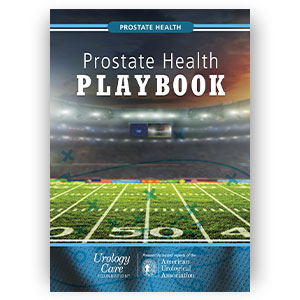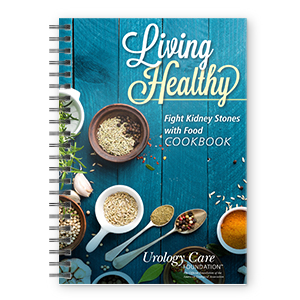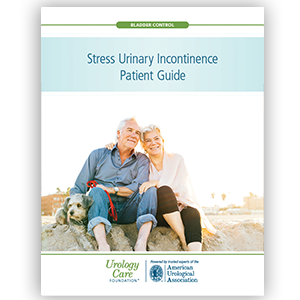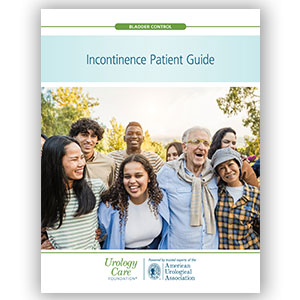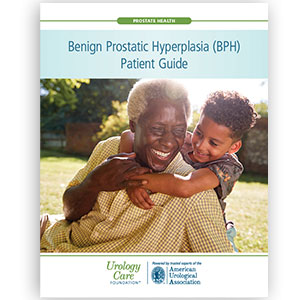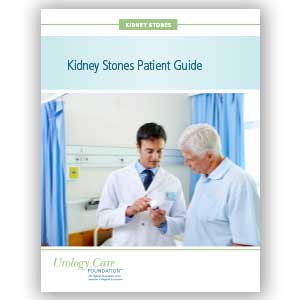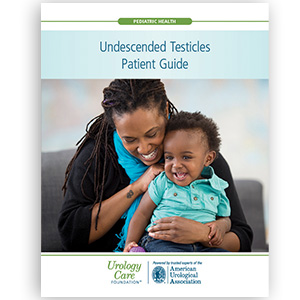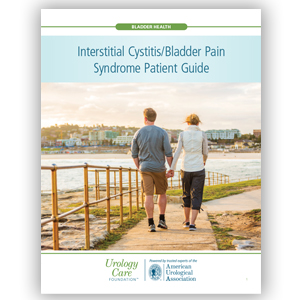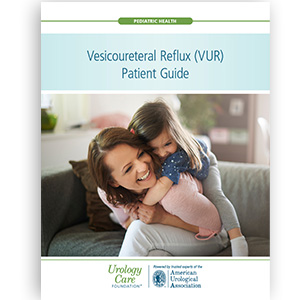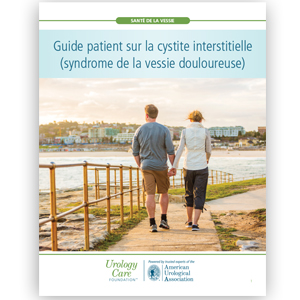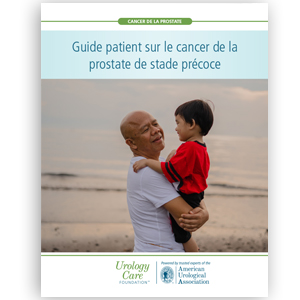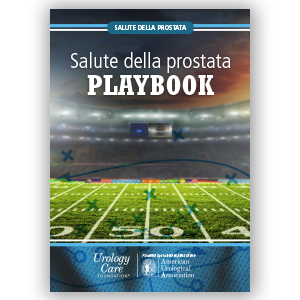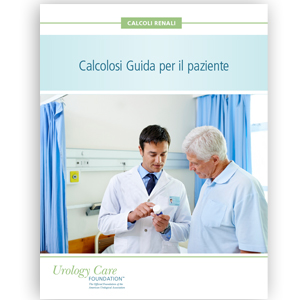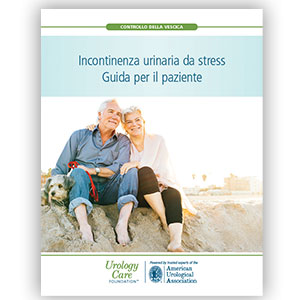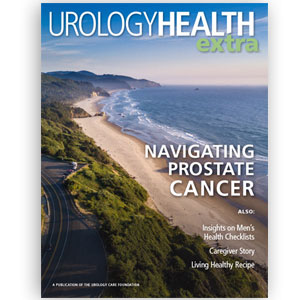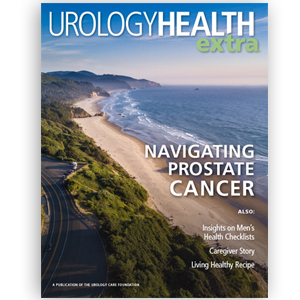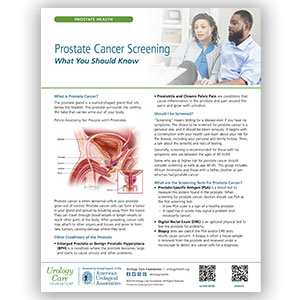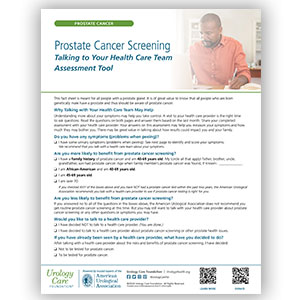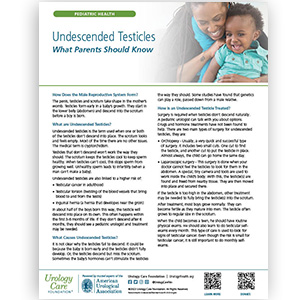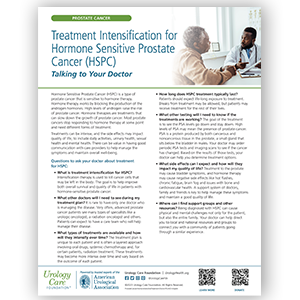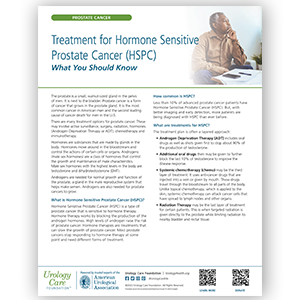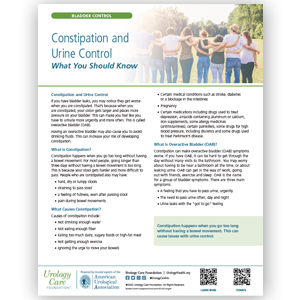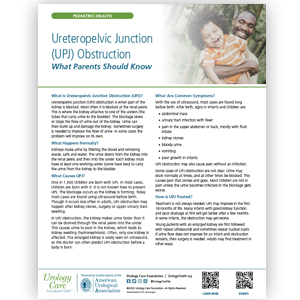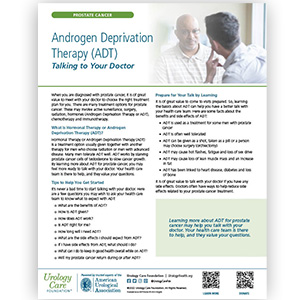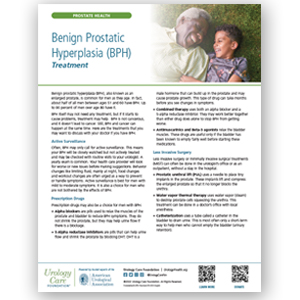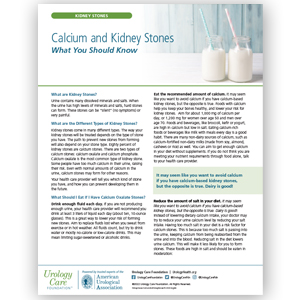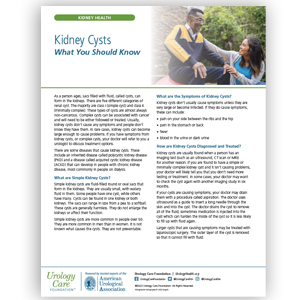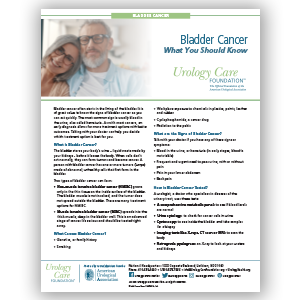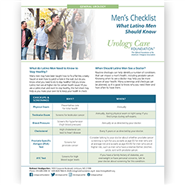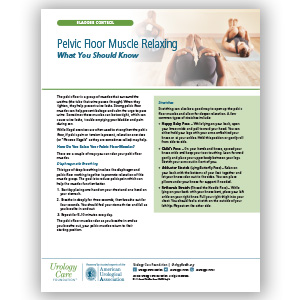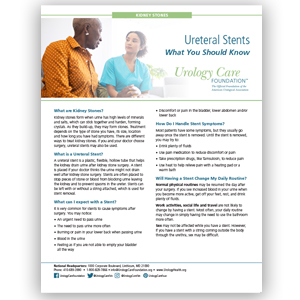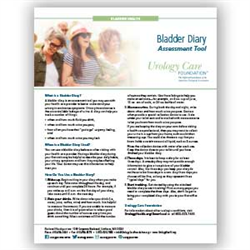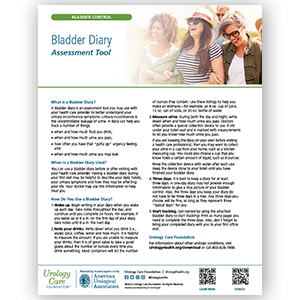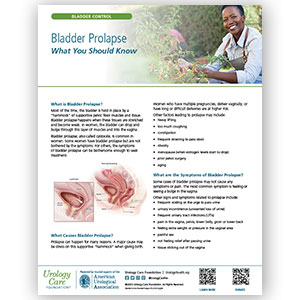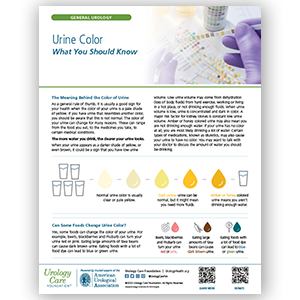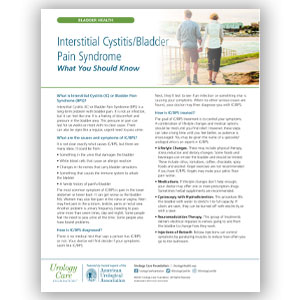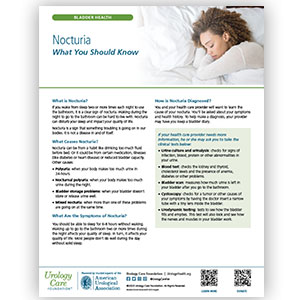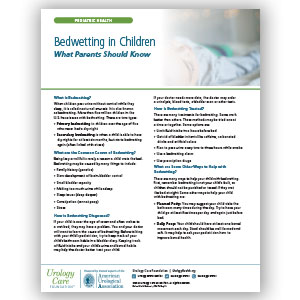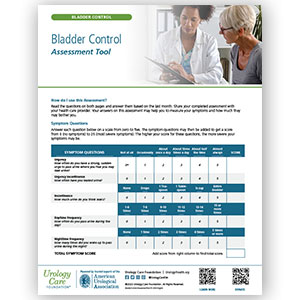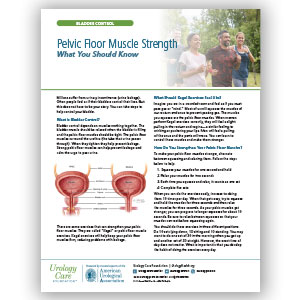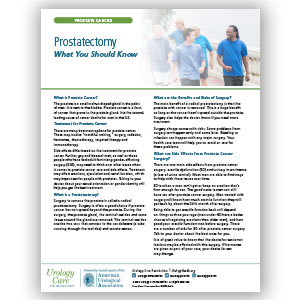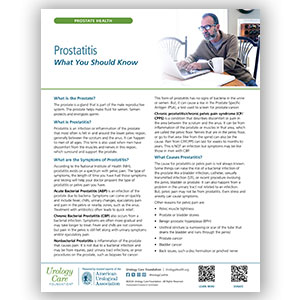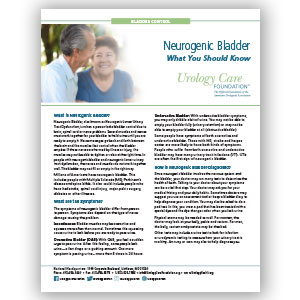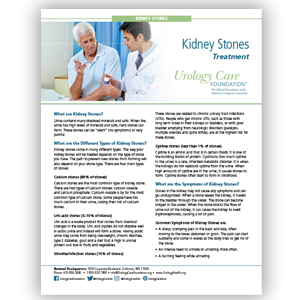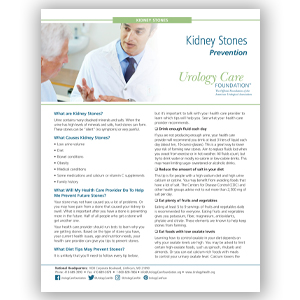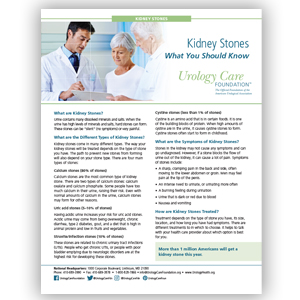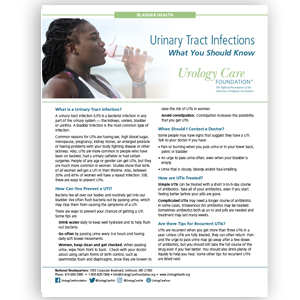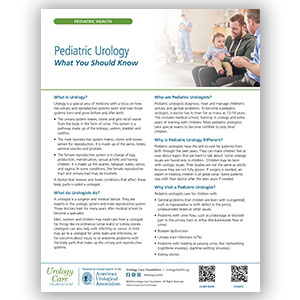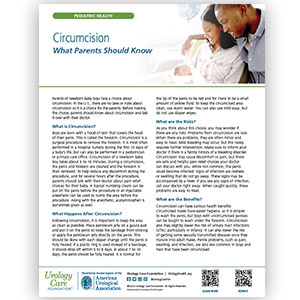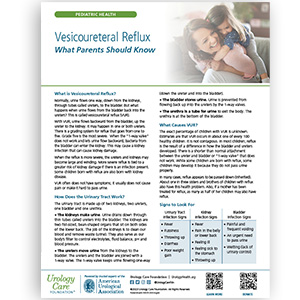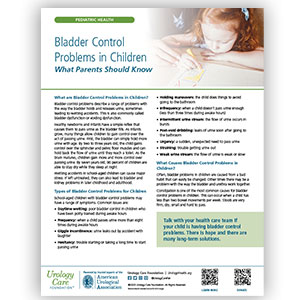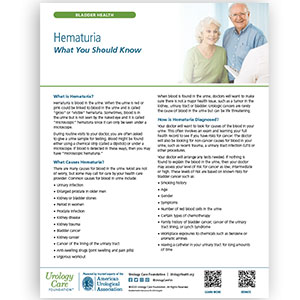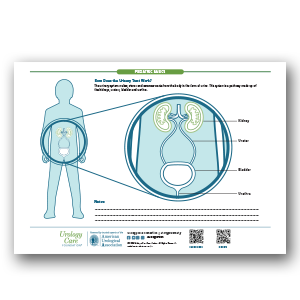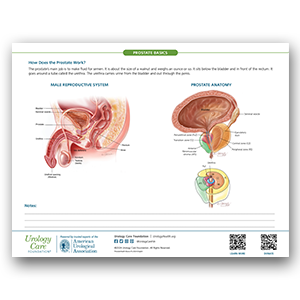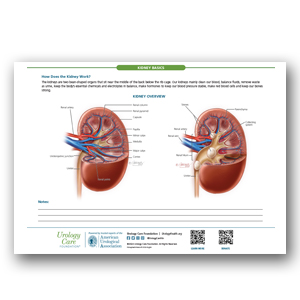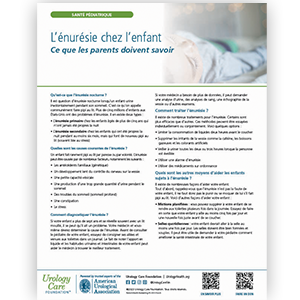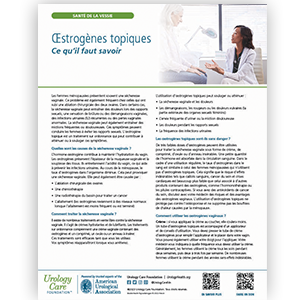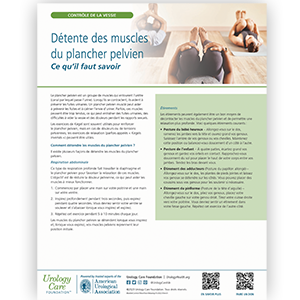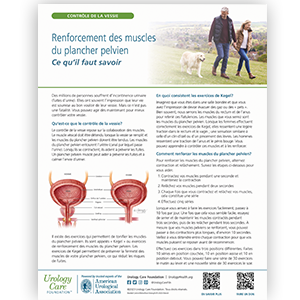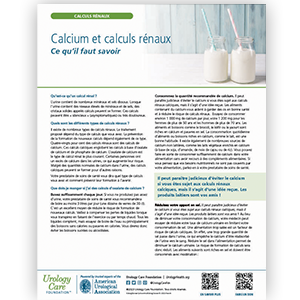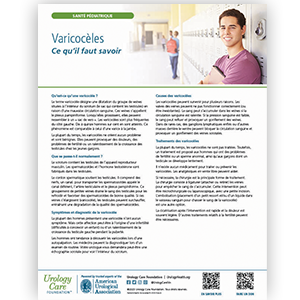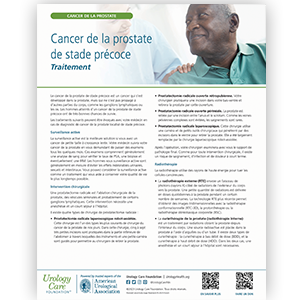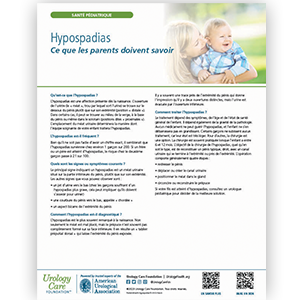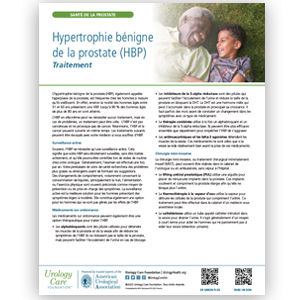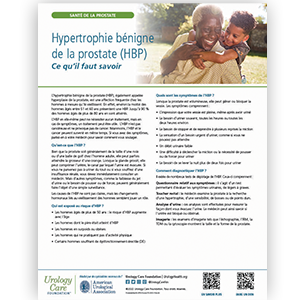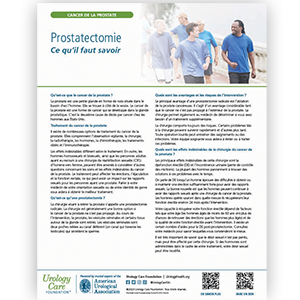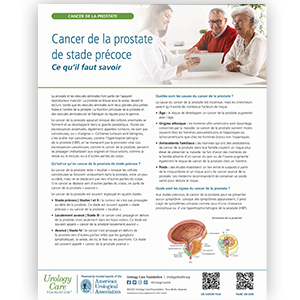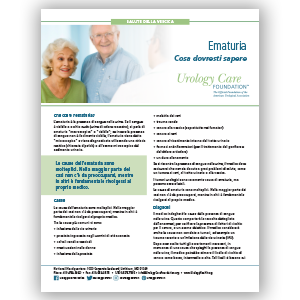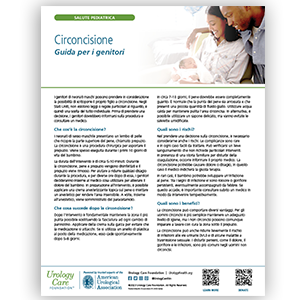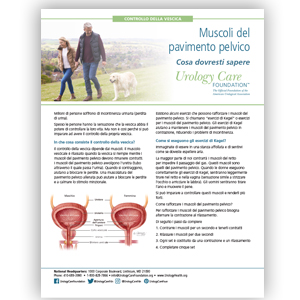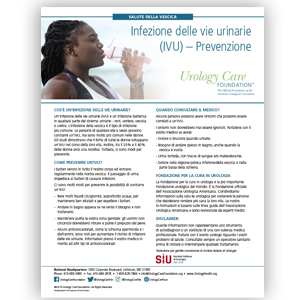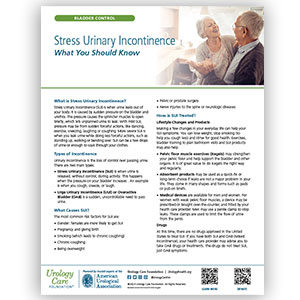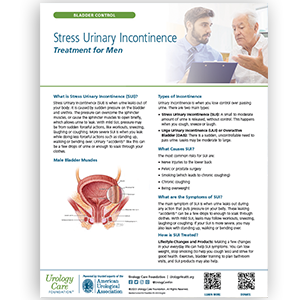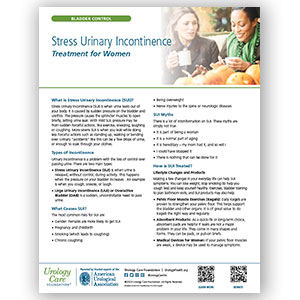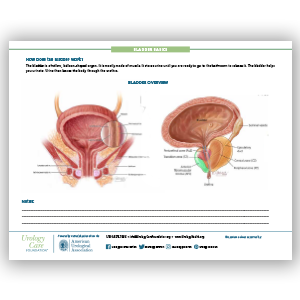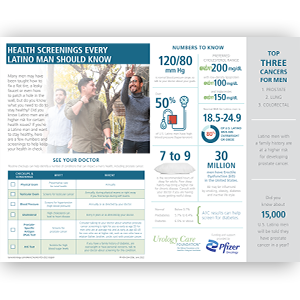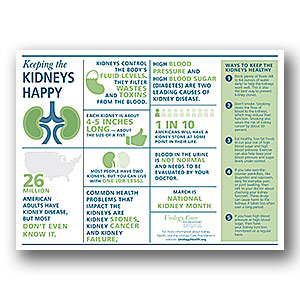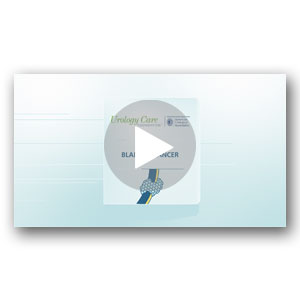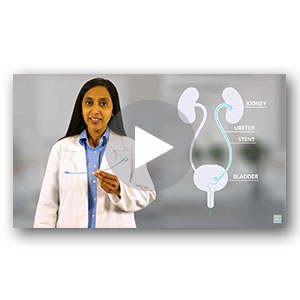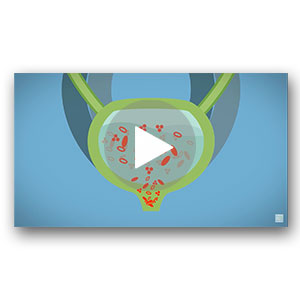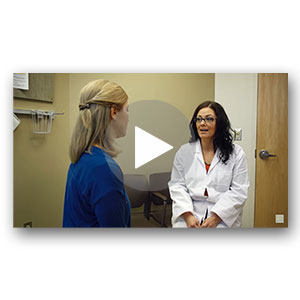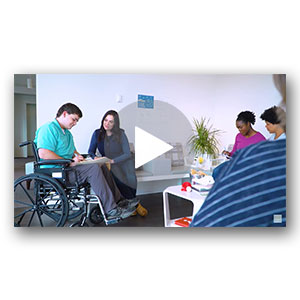Prostate Health Playbook
Order this football-themed prostate health resource covering prostatitis, BPH, incontinence as well as information on prostate cancer to include screening and treatment options.… more
Living Healthy: Fight Kidney Stones with Food Cookbook
An educational recipe book designed to help prevent kidney stones with nutrition and diet.… more
Stress Urinary Incontinence (SUI)
Download this patient resource on Stress Urinary Incontinence (SUI).… more
Prostate Health Playbook
Download this football-themed prostate health resource covering prostatitis, BPH, incontinence as well as information on prostate cancer to include screening and treatment options.… more
Interstitial Cystitis/Bladder Pain Syndrome (IC/BPS)
Download this patient guide to learn more information about IC/BPS and the urinary tract.… more
Guide patient sur la cystite interstitielle (syndrome de la vessie douloureuse)
La cystite interstitielle (CI), ou syndrome de la vessie douloureuse (SVD), est un problème de douleur vésicale chronique. Cela peut évoquer une infection de la vessie ou infection urinaire, mais ce n’en est pas une. Il s’agit d’une sensation d’inconfort et de pression dans la région de la vessie qui dure six semaines ou plus, sans infection ni autre cause évidente. (Patient Guide to Interstitial Cystitis (Painful Bladder Syndrome))… more
Guide patient sur le cancer de la prostate de stade précoce
Le cancer de la prostate est la deuxième cause de décès par cancer chez les hommes aux États-Unis. La plupart des hommes ayant un diagnostic précoce peuvent vivre longtemps. Choisir son traitement peut être difficile. Informez-vous et posez des questions afin de faire le choix qui vous conviendra le mieux. (Early-stage Prostate Cancer Patient Guide)… more
Salute della prostata - Playbook
Una risorsa sulla salute della prostata a tema sportivo che copre la prostatite, l’IPB e lo screening del cancro alla prostata, il trattamento e la vita dopo il cancro alla prostata. (Prostate Health Playbook)… more
Calcolosi - Guida per il paziente
Una guida completa per il paziente che spiega i sintomi, le cause e il trattamento dei calcoli renali.… more
Incontinenza urinaria da stress (SUI) - Guida per il paziente
Come diagnosticare, trattare e gestire la SUI, con inclusa la prospettiva del paziente. (Stress Urinary Incontinence Patient Guide)… more
Incontinenza - Guida per i pazienti
Milioni di persone negli Stati Uniti vivono con incontinenza e sintomi di controllo della vescica. Questa condizione può impedire a uomini, donne e bambini di vivere la vita che desiderano. La paura di essere lontani da un bagno può limitare le scelte nella vita quotidiana. (Incontinence Patient Guide)… more
Vescica iperattiva (OAB) - Guida per il paziente
Questa guida ti offre le informazioni necessarie su come gestire la OAB. Se pensi di aver bisogno di aiuto, chiedilo, anche se potrebbe sembrare imbarazzante. Non aspettare, perché ci sono molti trattamenti che funzionano bene contro la OAB. (Overactive Bladder Patient Guide)… more
UrologyHealth extra® – Bladder Cancer Special Issue
Order this special issue focusing on bladder cancer to be shipped free in the United States and includes information for patients and caregivers on the basics such as the stages of this cancer, symptoms, treatments, risk factors and how to learn more.… more
UrologyHealth extra® – Bladder Cancer Special Issue
Download this special issue focusing on bladder cancer that includes information for patients and caregivers on the basics such as the stages of this cancer, symptoms, treatments, risk factors and how to learn more.… more
UrologyHealth extra® – Navigating Prostate Cancer
Download this special issue focusing on prostate cancer that includes information for patients and caregivers on risk factors, healthy living tips and more.… more
UrologyHealth extra – Navigating Prostate Cancer
Order this special issue focusing on prostate cancer that includes information for patients and caregivers on risk factors, healthy living tips and more.… more
Prostate Cancer Screening What You Should Know
Order this patient-friendly prostate cancer screening fact sheet to be shipped free in the United States. This fact sheet is used to aid in decision making about prostate cancer screening.… more
Prostate Cancer Screening Talking to Your Health Care Team Assessment Tool
Download this free patient-friendly screening assessment tool designed to self-assess symptoms to help guide conversations with your health care team about prostate cancer screening. … more
Prostate Cancer Screening What You Should Know
Download this free patient-friendly fact sheet to aid in decision making about prostate cancer screening.… more
Benign Prostatic Hyperplasia (BPH) - What You Should Know Fact Sheet
A review of benign prostatic hyperplasia (BPH) to include general information, benefits, risks and side effects. … more
Treatment Intensification for Hormone Sensitive Prostate Cancer (HSPC) - Talking to Your Doctor Fact Sheet
Learn about treatment intensification for Hormone Sensitive Prostate Cancer and questions to ask your doctor.… more
Treatment for Hormone Sensitive Prostate Cancer (HSPC) - What You Should Know Fact Sheet
Learn about Hormone Sensitive Prostate Cancer, common treatments and what to expect after treatment.… more
Constipation and Urine Control - What You Should Know Fact Sheet
This fact sheet outlines what to know about constipation and urine control. Constipation happens when you go too long without having a bowel movement & this can cause issues with urine control. … more
Constipation and Urine Control: What You Should Know
Order this fact sheet that outlines what to know about constipation and urine control. Constipation happens when you go too long without having a bowel movement & this can cause issues with urine control. … more
Ureteropelvic Junction (UPJ) Obstruction - What Parents Should Know Fact Sheet
Learn about Ureteropelvic Junction (UPJ) Obstruction, its causes, symptoms and common treatments.… more
Androgen Deprivation Therapy (ADT) - Talking to Your Doctor Fact Sheet
Learn about how to talk to your doctor Androgen Deprivation Therapy (ADT) for prostate cancer.… more
Androgen Deprivation Therapy (ADT) – What You Should Know Fact Sheet
Learn about Androgen Deprivation Therapy (ADT) for prostate cancer, who should receive ADT, how is ADT given and the benefits, risks and side effects of ADT. … more
Benign Prostatic Hyperplasia (BPH) Treatment Fact Sheet
Benign prostatic hyperplasia (BPH), also known as an enlarged prostate, is common for men as they age. BPH itself may not need any treatment, but if it starts to cause problems, treatment may help.… more
Calcium and Kidney Stones - What You Should Know Fact Sheet
There are two types of calcium stones: calcium oxalate and calcium phosphate. This fact sheet outlines what you should know about calcium and kidney stones.… more
Kidney Cysts - What You Should Know Fact Sheet
As a person ages, sacs filled with fluid, called cysts, can form in the kidneys. This fact sheet outlines what you should know about kidney cysts.… more
Topical Estrogen – What You Should Know Fact Sheet
Women who have gone through menopause often have vaginal dryness. This problem is also common in those who have had both of their ovaries surgically removed. In some cases, vaginal dryness can lead to pain with sex, burning vaginal discomfort or itching, recurrent urinary tract infections (UTIs) or abnormal vaginal discharge. Topical estrogen is a prescription treatment that can help lower or ease these symptoms.… more
Bladder Exstrophy – What Parents Should Know Fact Sheet
Bladder exstrophy is a rare birth defect. On average, it occurs in about 1 out of every 50,000 live births. It is slightly more common in males than females. It is a condition where the bladder and parts around it form inside-out. … more
Bladder Cancer: What You Should Know
Learn more about the basics of bladder cancer including types, causes, symptoms, testing and treatment options. … more
Salvage Radiation Therapy for Prostate Cancer
Learn about salvage radiation therapy (SRT) as a type of cancer treatment given to men who had their prostate removed yet their prostate-specific antigen (PSA) levels begin to rise.… more
Genomic Diagnostic Testing for Prostate Cancer
Learn about genomic testing and how it may impact prostate cancer.… more
Pelvic Floor Muscle Relaxing: What You Should Know
Strong pelvic floor muscles can help prevent leakage and calm the urge to pass urine. Sometimes these muscles can be too tight, which can cause urine leaks, trouble emptying your bladder and pain during sex.… more
Ureteral Stents What You Should Know
A ureteral stent is a plastic, flexible tube that helps the kidney drain urine after kidney stone surgery. Learn about how they feel, how they are removed and when to call a doctor if you feel concerned. … more
Bladder Diary Assessment Tool
Use this bladder diary assessment tool and share the results with your healthcare provider to get a better understanding of your urinary incontinence symptoms. … more
Bladder Diary Assessment Tool
Use this bladder diary assessment tool and share the results with your healthcare provider to get a better understanding of your urinary incontinence symptoms. … more
Bladder Prolapse - What You Should Know
An overview of bladder prolapse causes, symptoms, diagnosis and treatment options.… more
Urine Color - What You Should Know
A fact sheet about the meaning behind the color of urine for people of all ages to know when to drink more, what can change urine color and when to talk with a doctor about urine color.… more
Interstitial Cystitis/Bladder Pain Syndrome (IC/BPS) Fact Sheet
Download this fact sheet to read a concise review of interstitial cystitis/bladder pain syndrome.… more
Hypospadias – What Parents Should Know
A short summary of Hypospadias, including signs, diagnosis, treatments and questions to ask your child’s doctor.… more
Varicoceles - What You Should Know
Designed for teen boys and men to explain this condition, causes, treatments and address frequently asked questions.… more
Bedwetting in Children: What Parents Should Know Fact Sheet
Download this fact sheet.… more
Bladder Control Assessment Tool
This Bladder Control assessment tool may help to measure symptoms and quality of life related to passing urine.… more
Pelvic Floor Muscle Strength: What You Should Know
Download this fact sheet on how to perform Kegel exercises.… more
Overactive Bladder Assessment Tool
An assessment tool that allows patient to score symptoms and illustrates how they may be affecting their quality of life.… more
Overactive Bladder Diary
This Overactive Bladder Diary may help to record liquid intake, how often urine is passed and urine leakage to help you talk with your health care team.… more
Bladder Control Assessment Tool
This Bladder Control assessment tool may help to measure symptoms and quality of life related to passing urine. … more
Prostatectomy – What You Should Know Fact Sheet
A review of prostatectomy for prostate cancer treatment to include general information, benefits, risks and side effects. … more
Neurogenic Bladder - What You Should Know Fact Sheet
A fact sheet that helps patients to understand when nerve damage causes bladder problems and how to manage the condition.… more
Urinary Tract Infections - What You Should Know
A description of urinary tract infections to include tips on how to prevent UTIs.… more
Bladder Control Problem in Children - What Parents Should Know
Download this fact sheet.… more
Pediatric Urology Basics
The basics about urinary function in children with notes section to help patients, parents and health care teams.… more
Prostate Basics
The basics about prostate function and prostate cancer with notes section to help patients and health care teams.… more
Kidney Basics
The basics about kidney function, kidney stones and kidney cancer with notes section to help patients and health care teams.… more
L’énurésie chez l’enfant: Ce que les parents doivent savoir
Il est question d’énurésie nocturne lorsqu’un enfant urine involontairement pendant son sommeil. C’est ce qu’on appelle communément faire pipi au lit. Plus de cinq millions d’enfants aux États-Unis ont des problèmes d’énurésie. (Bedwetting – What Parents Should Know Fact Sheet)… more
OEstrogènes topiques: Ce qu’il faut savoir
Les femmes ménopausées présentent souvent une sécheresse vaginale. Ce problème est également fréquent chez celles qui ont subi une ablation chirurgicale des deux ovaires. Dans certains cas, la sécheresse vaginale peut entraîner des douleurs lors des rapports sexuels, une sensation de brûlure ou des démangeaisons vaginales, des infections urinaires (IU) récurrentes ou des pertes vaginales anormales. (Topical Estrogen – What You Should Know Fact Sheet)… more
Détente des muscles du plancher pelvien: Ce qu’il faut savoir
Un plancher pelvien musclé peut aider à prévenir les fuites et à calmer l’envie d’uriner. Parfois, ces muscles peuvent être trop tendus, ce qui peut entraîner des fuites urinaires, des difficultés à vider la vessie et des douleurs pendant les rapports sexuels. (Pelvic Floor Muscle Relaxing – What You Should Know Fact Sheet)… more
Renforcement des muscles du plancher pelvien: Ce qu’il faut savoir
Des millions de personnes souffrent d’incontinence urinaire (fuites d’urine). Elles ont souvent l’impression que leur vie est soumise au bon vouloir de leur vessie. Mais ce n’est pas une fatalité. Vous pouvez agir dès maintenant pour mieux contrôler votre vessie. (Pelvic Floor Muscle Strength – What You Should Know Fact Sheet)… more
Calcium et calculs rénaux: Ce qu’il faut savoir
L’urine contient de nombreux minéraux et sels dissous. Lorsque l’urine contient des niveaux élevés de minéraux et de sels, des cristaux solides appelés calculs peuvent se former. Ces calculs peuvent être « silencieux » (asymptomatiques) ou très douloureux. (Calcium and Kidney Stones – What You Should Know Fact Sheet)… more
Varicocèles: Ce qu’il faut savoir
Le terme varicocèle désigne une dilatation du groupe de veines situées à l’intérieur du scrotum (le sac qui contient les testicules) en raison d’une mauvaise circulation sanguine. (Varicoceles – What You Should Know Fact Sheet)… more
Cancer de la prostate de stade précoce: Traitement
Les traitements suivants peuvent être évoqués avec votre médecin en cas de diagnostic de cancer de la prostate localisé de stade précoce. (Early-stage Prostate Cancer Treatment Fact Sheet)… more
Hypertrophie bénigne de la prostate (HBP): Traitement
L’HBP en elle-même peut ne nécessiter aucun traitement, mais en cas de problèmes, un traitement peut être utile. L’HBP n’est pas cancéreuse et ne provoque pas de cancer. Néanmoins, l’HBP et le cancer peuvent survenir en même temps. Les traitements suivants peuvent être évoqués avec votre médecin si vous souffrez d’HBP. (BPH Treatment Fact Sheet)… more
Hypertrophie bénigne de la prostate (HBP): Ce qu’il faut savoir
L’hypertrophie bénigne de la prostate (HBP), également appelée hyperplasie de la prostate, est une affection fréquente chez les hommes à mesure qu’ils vieillissent. (BPH - What You Should Know Fact Sheet)… more
Prostatectomie: Ce qu’il faut savoir
La chirurgie visant à retirer la prostate s’appelle une prostatectomie radicale. La chirurgie est généralement une bonne option si le cancer de la prostate ne s’est pas propagé. (Prostatectomy - What You Should Know Fact Sheet)… more
Cancer de la prostate de stade précoce: Ce qu’il faut savoir
Le cancer de la prostate apparait lorsque des cellules anormales se forment et se développent dans la glande prostatique. Toutes les excroissances anormales, également appelées tumeurs, ne sont pas cancéreuses, ou « malignes ». Certaines tumeurs sont bénignes, c’est-à-dire non cancéreuses, comme l’hypertrophie bénigne de la prostate (HBP), et ne menacent pas le pronostic vital. (Early-stage Prostate Cancer - What You Should Know Fact Sheet)… more
Varicocele - Cosa dovresti sapere
Pensato per spiegare a uomini adulti e adolescenti questa condizione, le sue cause e i trattamenti, e per rispondere alle domande frequenti.… more
Circoncisione - Guida per i genitori
I genitori che stanno valutando la circoncisione possono apprendere informazioni sulla procedura, sui rischi e sul processo di guarigione. (Circumcision: What Parents Should Know Fact Sheet)… more
Muscoli del pavimento pelvico - Cosa dovresti sapere
I pazienti imparano a sfruttare gli esercizi di Kegel per rafforzare i muscoli del pavimento pelvico… more
Infezione delle vie urinarie (IVU) – Prevenzione
Una descrizione delle infezioni delle vie urinarie che include suggerimenti su come prevenire le IVU.… more
Prostatite - tutto quello che dobbiamo sapere
La prostatite è un’infezione o infiammazione della prostata, che si avverte principalmente nella zona pelvica o in prossimità della stessa, in genere tra lo scroto e l’ano.(Prostatitis - What You Should Know Fact Sheet)… more
Bladder Basics
The basics about bladder function and bladder cancer with notes section to help patients and health care teams. … more
Health Screenings Every Latino Man Should Know Poster
Did you know Latino men are at higher risk for many health issues? This free download includes numbers and screenings to help Latino men keep their health in check.… more
Bladder Cancer: Get the Facts
Did you know bladder cancer is the 10th most common cancer in the world? This patient education video from the Urology Care Foundation will tell you all of the facts you need about bladder cancer. … more
Ureteral Stents: What You Need to Know
If you have a kidney stone, treatment options vary. If you and your doctor choose surgery as treatment for your stone, a ureteral stent may be used.… more


